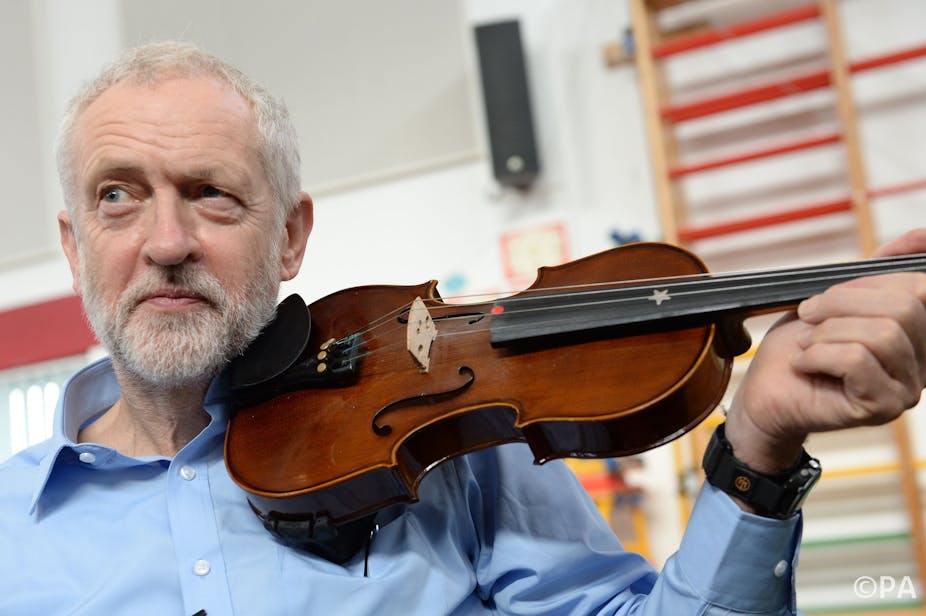When Jeremy Corbyn won his second Labour leadership contest, the Guardian pronounced it Groundhog Day. And I, too, seem to find myself retracing the same ground(hog). Earlier this year I wrote a piece on the underdog hero and the fairytale of Leicester City – a theme I subsequently revived for a podcast. And so I find myself back at Groundhog Zero: considering once again the figure of the underdog hero.
For many would agree that this is what Jeremy Corbyn is – or at least, that is the archetypal role in which he has unwittingly been cast. Dubbed “the accidental leader”, the apparently unassuming figure in his rumpled suits has captured the hearts and minds of vast swaths of the populace. Every attempt to dismiss or criticise him – whether such attempts have come from the mainstream media or from his own party – have only further inflamed his supporters to his defence.
The fact that Corbyn shares his initials with a certain Son of God may be a coincidence, but it’s difficult to ignore the proto-religious fervour that has accompanied JC on his whirlwind tour of top-level politics. #WeAreHisMedia, proclaimed the hashtag, using the capitalised masculine pronoun in a way more often found on Sunday morning billboards. In keeping with the strangely Biblical flavour, his detractors are not infrequently cast as Zionists or Blairites – with even the latter sounding suspiciously like a fictional Hebraic tribe from a Monty Python movie.
Underdog heroes are a staple of folklore and myth. Stories such as Jack and the Beanstalk, the Brave Little Tailor and Aladdin all celebrate the hero who transcends his humble origins and ascends to ultimate power. At the same time, myth shares certain of its functional aspects with religion. Biblical underdog heroes such as Moses, David (of Goliath fame) and especially Jesus were all saviours who stood up against the oppressor class. As such they are particularly resonant in our western Judaeo-Christian culture – perhaps especially in Britain, where forms of politico-religious nonconformism frequently underpinned an inheritance of working-class resistance and dissent in the industrial age.
Britain, too, has a national folk hero in the form of the legendary Robin Hood, based purely on his supposed endeavours to redistribute wealth. Unlike America, where wealth distribution is not always considered cause for celebration, Britain is a largely secular country as far as its politics and public life are concerned. And yet the structural archetypes of religion and myth persist, surfacing and resurfacing like the humps of an impossibly long-lived sea monster.
Human culture has defined and made sense of itself through myths and stories since time immemorial – and this basic human tendency remains, even if the myths assume different forms. Nowadays our popular heroes and villains are celebrities and politicians, whom we assume to be “real” but are little more than shared fantasy projections deriving from our collective need for myth.
Psychoanalytically speaking, the existence of an underdog hero at the mythic or dream level is what Freud would have termed a “wish-fulfilment fantasy”. As such, the underdog hero essentially becomes the opposite of a scapegoat: rising to prominence during times of social anxiety and disempowerment, he is a figure onto whom the wishes of the people are projected, their singular powerlessness transformed through their collective desire for empowerment. The diminutive but uncharacteristically powerful underdog thereby comes to represent and embody their imagined and wished-for social transformation.
Underdog heroes can represent the child in all of us: we want to rebel against the powerful social forces that dominate our adult lives just as the child does against the adult. So the fact that underdog heroes assume new levels of visibility during times of social stress and transition should not surprise us. The underdog represents an entire class of people, the unexpected triumph of the weak over the strong.
Whether or not the underdog hero effects genuine change is another matter. In fairytales, the underdog hero usually only needs to succeed within the narrow confines of his own narrative; he wins the princess, he wins the kingdom – or, in Jeremy Corbyn’s case, he wins the leadership election. The narrative seldom requires the hero demonstrate his skill in bringing the kingdom to altered and successful governance after the resolution of the story; he brings no definable change to the social order. In fairytales, there is nothing beyond the “happily ever after”.
So the problem of the real-life underdog hero is that his success pertains, not to society as a whole, but only to the perception of the hero himself. In his transformation from underdog to hero, his supporters see themselves transformed – temporarily at least. A hero becomes a screen for our collective projections – which is why it is so difficult for us to let go of the dreams he represents.
But Jeremy Corbyn is a man – not a myth. If the social transformation he represents is an archetypal one, driven by collective wish-fulfilment fantasies and unconscious projections, such transformations may not necessarily be translated successfully to our everyday reality. So how the denouement unfolds beyond the “happily ever after” remains to be seen. The ending to this particular fairytale has yet to be told.

